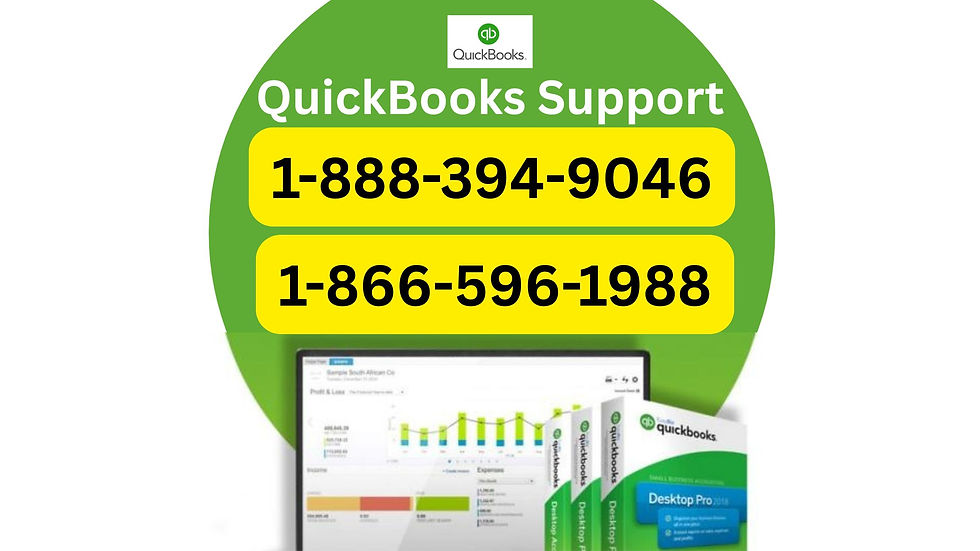The Future of QuickBooks Desktop 2022: Is It Going Away?
- jakkibhasker
- May 29, 2025
- 5 min read

QuickBooks Desktop has long been a staple in small and mid-sized business accounting. Among the most widely used versions is QuickBooks Desktop 2022, known for its enhanced speed, modern features, and stability. However, with rapid changes in Intuit’s strategic direction and increased focus on cloud computing, many business owners are now asking: “Is QuickBooks Desktop 2022 going away?”
This comprehensive guide explores the status of QuickBooks Desktop 2022, its future within Intuit’s ecosystem, what discontinuation might mean, and how to prepare your business for what’s next.
A Brief Overview of QuickBooks Desktop 2022
QuickBooks Desktop 2022 was released in September 2021 with several notable improvements:
Enhanced 64-bit performance for faster operations
Improved bank feeds
Automatic bill creation from vendor emails
Customized bill payment stubs
Advanced document management tools
It was also the first Desktop version that required annual subscription licensing, signaling a major shift away from the one-time purchase model. These changes were designed to improve user experience, security, and performance—but also hinted at Intuit’s move toward a subscription-based model across the board.
What Is the Lifecycle of QuickBooks Desktop Products?
Intuit follows a three-year product lifecycle for QuickBooks Desktop. This means that technical support, software updates, and connected services (like payroll, payments, and online banking) are provided for three years from a version’s release date.
Version | Release Year | Support Ends |
QB Desktop 2020 | 2019 | May 31, 2023 |
QB Desktop 2021 | 2020 | May 31, 2024 |
QB Desktop 2022 | 2021 | May 31, 2025 |
Conclusion: QuickBooks Desktop 2022 will no longer receive official support from Intuit after May 31, 2025. While the software will still be functional, it will lose critical connected services.
Is QuickBooks Desktop 2022 Being Discontinued?
Technically, no. QuickBooks Desktop 2022 is not being discontinued immediately. However, it is subject to Intuit’s standard service discontinuation policy. After May 2025:
You won’t receive security patches
Online services like payroll, payments, and bank feeds will stop
You won’t be able to contact Intuit for product support
This shift marks a de facto phase-out rather than a sudden cancellation. The writing is on the wall: support for Desktop products is winding down, even if they haven’t been officially labeled as discontinued.
Why Is Intuit Moving Away from QuickBooks Desktop?
Several factors contribute to Intuit’s decision to gradually shift focus from Desktop to Online products:
a. Shift Toward the Cloud
QuickBooks Online (QBO) allows users to access data anytime, anywhere, and from any device. This convenience is a driving force behind Intuit’s investments in cloud-first solutions.
b. Real-Time Collaboration
QBO allows multiple users, including accountants, to access files simultaneously—no need to email files or worry about version conflicts.
c. Automatic Updates and Backups
Unlike Desktop, QuickBooks Online offers automatic updates and built-in cloud backups, reducing the risk of data loss or outdated features.
d. Lower Maintenance Costs
Intuit no longer has to maintain legacy systems or support different Desktop environments, allowing them to focus on scalable, modern infrastructure.
What Will Stop Working After the Discontinuation Date?
Here’s what users can expect to lose after May 31, 2025, when support for QuickBooks Desktop 2022 ends:
Payroll Services: No access to updated tax tables or payroll calculations
Bank Feeds: Automatic bank downloads will cease to function
Merchant Services: Credit card and ACH payments won’t process through the system
Bill Pay: Online bill payment will stop working
Technical Support: Intuit’s support staff will no longer offer help for issues related to Desktop 2022
Software Updates: No more bug fixes or security patches
Can I Still Use QuickBooks Desktop 2022 After Support Ends?
Yes, but with limitations. While the software will still open and basic functions like bookkeeping and invoicing may continue to work, any feature that relies on the internet will fail to operate properly.
This includes:
Payroll
Online banking
Payment integrations
Live technical support
More importantly, using outdated software increases the risk of security breaches, compliance issues, and data corruption.
Your Options Going Forward
As the clock ticks toward May 2025, you have a few practical options:
Option 1: Upgrade to a Newer QuickBooks Desktop Version
You can move to QuickBooks Desktop 2023 or 2024, both of which come with enhanced features and security. However, remember that Intuit is now offering Desktop software only via annual subscription—no more one-time licenses.
Option 2: Switch to QuickBooks Online
This is Intuit’s preferred solution. QuickBooks Online offers:
Cloud-based access
Mobile apps
Real-time updates
Integrations with third-party tools
Stronger security and backups
Option 3: Consider Alternatives
Some businesses may find alternatives like Xero, FreshBooks, or Zoho Books better suited to their needs, especially if they’re looking for different pricing models or industry-specific features.
Pros and Cons of Moving to QuickBooks Online
Pros:
Anywhere access via web or mobile
Real-time collaboration with your accountant
Automatic backups and updates
More frequent feature releases
Easy integration with business apps
Cons:
Learning curve if you’re used to Desktop
Different user interface
Monthly fees over time may exceed Desktop one-time pricing
Feature parity: some Desktop features may not be available in QBO
Before switching, carefully compare both versions to ensure your essential workflows are covered.
What Happens to My Data?
If you decide to upgrade or migrate:
Upgrading Desktop: Your company file can be opened in the newer version.
Migrating to Online: Intuit provides a data migration tool to move customers, invoices, and other data from Desktop to Online.
Make sure to create a backup before any migration. You may also want to work with a QuickBooks ProAdvisor or specialist to ensure nothing is lost in transition.
How to Prepare for the Future
With the end of QuickBooks Desktop 2022 support in sight, here’s how to future-proof your business:
a. Review Your Usage
Understand how your team uses QuickBooks Desktop. Do you rely on payroll, online payments, or bank feeds?
b. Talk to Your Accountant
They can offer insight into whether staying on Desktop or switching to QBO is better for tax filing and reporting needs.
c. Evaluate Your Budget
Consider both short-term and long-term costs of subscription software.
d. Plan the Migration
Allow several weeks for data transfer, testing, and training if you choose to switch.
Final Thoughts
Is QuickBooks Desktop 2022 going away? Not overnight—but it’s on the path to obsolescence.
By May 31, 2025, support, payroll updates, and online services will be gone. While the core software may still function, relying on outdated tools isn’t sustainable for businesses needing compliance, security, and connectivity.
Now is the time to evaluate your options, make a plan, and transition smoothly to the next phase—whether that’s QuickBooks Desktop 2024, QuickBooks Online, or another solution that fits your workflow.
Would you like this article converted to a downloadable PDF or optimized for a web page?



Comments